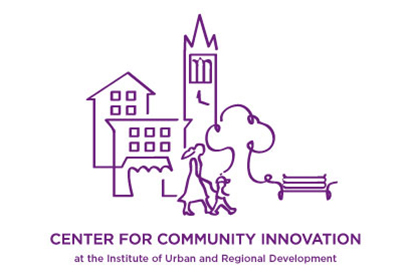Positive prospects for California’s green businesses, study finds
California’s green businesses are more focused on local markets and more likely to stay in the Golden State than are their non-green counterparts, according to a University of California, Berkeley, study released Thursday (Jan. 21). And when compared with traditional businesses, green ones are more likely to expand.

January 22, 2010
California’s green businesses are more focused on local markets and more likely to stay in the Golden State than are their non-green counterparts, according to a University of California, Berkeley, study released Thursday (Jan. 21). And when compared with traditional businesses, green ones are more likely to expand.
“Innovating the Green Economy,” a report by researchers at UC Berkeley’s Center for Community Innovation (CCI), was unveiled at yesterday’s conference on green economy innovation. (A policy brief from the report, titled “Green, Local, and Growing,” is posted on the CCI website; the complete report will be available on the website next Wednesday.) Sponsored by the U.S. Economic Development Administration, the study comes at a time of heightened economic anxiety and of renewed pledges by elected leaders in Washington, D.C., and Sacramento to focus their efforts on job creation — especially green jobs.
The researchers found that in California, the green economy accounts for just one percent of jobs in the state, but is growing about 50 percent faster than the rest of the economy overall.
And while the green economy’s innovation appears concentrated regionally in areas such as the East Bay, Silicon Valley, San Diego and the Central San Joaquin Valley — there’s evidence of wide ripple effects in terms of jobs as green businesses concentrate on new products and services and as many traditional firms develop new green processes within their operations.
“This suggests that the entire state stands to benefit from the growth of the green economy,” reads the introduction to the report that William Kittredge, director of the Economic Development Administration’s Performance and National Programs Division, described yesterday as “groundbreaking.”
It’s standard conventional wisdom that businesses frown on governmental regulation, and the UC Berkeley survey found that green and non-green businesses both see a need to streamline permit processes. Yet, researchers said green businesses are twice as likely as traditional businesses to see the positive impacts of government regulation and public policies, and they think standardized policies and rules could help local green businesses expand into global markets.
The study found that green businesses also favor more governmental interventions in the form of increased financial incentives for low- and middle-income families and businesses for their energy conservation, and more public education to increase consumer demand for products like sustainable landscaping and soil management practices.
Details of the study’s key findings include:
• Some 51 percent of green businesses plan to grow in 2010, compared to 39 percent of traditional businesses and 30 percent of (Toxic Release Inventory or TRI) firms that report toxic chemical releases and waste management activities to the U.S. Environmental Protection Agency.
• Seventy-seven percent of green businesses and 65 percent of traditional ones plan to expand their green business practices, which are defined as activities that reduce energy use and or improve environmental quality.
• Twenty percent of green companies in the survey said they have considered locating outside of their California territory, with 65 percent saying they’ve looked elsewhere in California, 32 percent saying they’ve explored another location in the United States and 3 percent mulling over international sites.
• Only 32 percent of traditional companies said they would consider relocating within California, although 59 percent said they would be open to new locations in other parts of the country.
“Local governments have been waiting for the federal stimulus to create the green economy for them, but they can be proactive and build their own green market,” said Karen Chapple, director of the Center for Community Innovation and an UC Berkeley associate professor of city and regional planning.
The study is based on a survey from April 15 to July 15, 2009, in which 649 different types of businesses answered questions about their thoughts about and experiences with their regions green economy.
Report authors included Chapple; Malo Hutson, a UC Berkeley assistant professor of city and regional planning; Cynthia Kroll, a senior economist and executive director at the Fisher Center for Real Estate and Urban Development at UC Berkeley’s Haas School of Business; Larry Rosenthal, director of the Berkeley Program on Housing and Urban Policy and an assistant adjunct professor at UC Berkeley’s Goldman School of Public Policy; and Sergio Montero, a 2009 UC Berkeley master’s of city planning graduate.
UC Berkeley is a member of the East Bay Green Corridor Partnership, along with Lawrence Berkeley Laboratory and the cities of Berkeley, Oakland, Richmond and Emeryville.
The green economy conference was held at the David Brower Center in the city of Berkeley and drew approximately 200 representatives from non-profits and businesses, government leaders, academics, consultants and students.